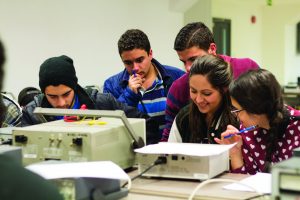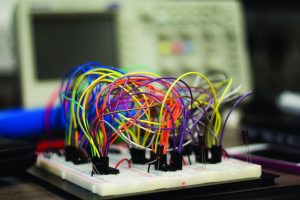Lars Lorenz interviews Dr Ing. Andrew Sammut to find out about the Faculty of Engineering’s recent EU funded laboratory and the research it has enabled.
Many engineering  graduates are well trained in theoretical work, but can come up short in practice. To combat this deficit, the Faculty of Engineering has invested heavily in laboratory equipment. The most recent is a €839,442 EU grant, which has helped with the modernising of the prototyping facility at the Department of Electronic Systems Engineering.
graduates are well trained in theoretical work, but can come up short in practice. To combat this deficit, the Faculty of Engineering has invested heavily in laboratory equipment. The most recent is a €839,442 EU grant, which has helped with the modernising of the prototyping facility at the Department of Electronic Systems Engineering.
Students can now work in a fully equipped laboratory fitted with state-of-the-art equipment. The laboratory is designed to replicate the standard electronic production lifecycle common in real world industry.
To experiment with new ideas and potential products, the laboratory allows the simulation of complex electronic designs. This means students can use industry standard software to virtually test and improve their design, then build it with real components. Students can produce entire circuit boards from scratch, and combine all their components to create a finished product. Individual parts can easily be created by utilising the laboratories’ high-precision manufacturing machinery. For the final assembly students can make use of various professional soldering equipment, semi-automated assembly, and sophisticated rework stations.
 The lab is used for many research projects. Project leader Dr Ing. Andrew Sammut (Dean, Faculty of Engineering) draws attention to one project that involves the building of CubeSats. These are tiny satellites, only around 5cm3 in size that are launched into low-earth orbit. They c an be used as an experimental platform to gather information about the earth’s atmosphere, or to enhance telecommunications. A CubeSat costs €30,000 rather than the €50 million that regular satellites cost. Other ongoing projects involve the design of navigation systems for drones and the instrumentation of the University’s racing car.
The lab is used for many research projects. Project leader Dr Ing. Andrew Sammut (Dean, Faculty of Engineering) draws attention to one project that involves the building of CubeSats. These are tiny satellites, only around 5cm3 in size that are launched into low-earth orbit. They c an be used as an experimental platform to gather information about the earth’s atmosphere, or to enhance telecommunications. A CubeSat costs €30,000 rather than the €50 million that regular satellites cost. Other ongoing projects involve the design of navigation systems for drones and the instrumentation of the University’s racing car.
What is great about this set-up is that students work alongside experienced researchers, gaining skills they can use throughout their career. With engineering forming the backbone of Malta’s industry and infrastructure, it remains crucially important for Malta’s economy to train excellent engineers.





